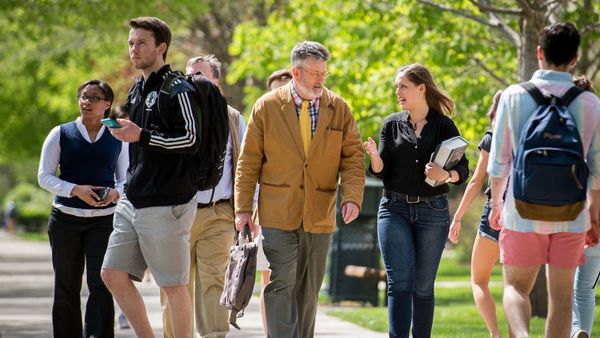Notre Dame's Vision for Undergraduate Education

While some might view the purpose of a research university differently, Notre Dame holds the flourishing of its undergraduates as a priority that is second to none—so much so that the University has put forth a formal vision for undergraduate education.
This statement was crafted by faculty, refined through an open-comment period, and then adopted by Notre Dame’s Academic Council; a similar process subsequently produced a list of expected learning outcomes for undergraduates.
All undergraduates, from history majors to budding electrical engineers, complete a Core Curriculum designed to expose them to diverse modes of thought for approaching, analyzing, and understanding different aspects of our lives and our world.
The Undergraduate Academic Code governs attainment of academic credit and degrees by undergraduate students at the University of Notre Dame.
Notre Dame's Office of Undergraduate Education advises, supports, and scaffolds the undergraduate experience and coordinates, convenes, and develops University-wide academic programs and policies.
Vision for Undergraduate Education
Notre Dame is a vibrant academic community dedicated to scholarship and the advancement of knowledge, where students find opportunities on campus and abroad to develop initiative and leadership, and to learn by being fully engaged in our classrooms, libraries, research laboratories, studios, and residence halls, among other venues. Notre Dame seeks to nurture in its students intellectual passion and a keenly developed moral sense, goals attainable only where freedom of thought and expression flourishes in a culture built on respect, responsibility and integrity.
Drawing on our Catholic intellectual tradition, which fosters the integration of faith and reason, Notre Dame offers an undergraduate education rooted in the fundamental belief that all truths participate in the Divine Truth, a belief that motivates the vigorous search for knowledge.
Notre Dame inspires students to pursue learning as a good in itself and to see that pursuit as involving the whole person. We cultivate each student’s capacity to think creatively and critically while valuing the rich inheritance that comes from our shared past. We expect our graduates to be conversant with and equipped to contribute to the best thinking across the disciplines. Notre Dame helps students acquire the virtues necessary for living a good human life and prepares them to become leaders in their professions, for their communities, the Church, and the world.
As a community committed to service, we challenge students to grow in their understanding of complex human realities, and we call them to respond to the needs of the world with compassion and committed action. By educating students to be engaged by both their intellectual labors and their faith, we aspire to offer an education that is Catholic in the broadest sense of the word, both in welcoming all persons of good will to our university community and turning outward to embrace the larger world.
Formed by a rich liberal education and possessed of mature faith in service to others, our graduates leave Notre Dame prepared to take their places at the forefront of discovery, innovation, and human achievement.
University Learning Outcomes for Undergraduates
In order to lay the foundations for life‐long learning, by the time they graduate, Notre Dame undergraduates will be able to:
A. Acquire, synthesize, and communicate knowledge by incorporating relevant disciplinary approaches, cultural perspectives, and Catholic intellectual tradition.
B. Recognize moral and ethical questions in lived experiences, evaluate alternatives, and act with integrity.
C. Contribute to the common good by displaying a disciplined sensibility and committed engagement in response to complex challenges facing local, national, or global communities.
D. Demonstrate the vision and self‐direction necessary to articulate, set, and advance toward their goals.
E. Think critically in formulating opinions or accepting conclusions.
F. Exhibit creativity or innovation in the pursuit of their intellectual interests.
G. Display a level of mastery in their major field(s) of study that enables them to successfully pursue professional careers or advanced study.
Ensuring that every student can flourish
In the spring of 2023, Notre Dame’s president, Rev. John I. Jenkins, C.S.C., formed a committee to “think about further steps we at Notre Dame might take to enable our students from low-resourced backgrounds to be as successful as they can be.” The committee did a comprehensive assessment of the University’s current support structures, reviewed successful programs at other institutions, and submitted a white paper with a set of recommendations that are currently being implemented.